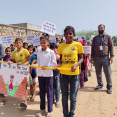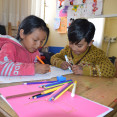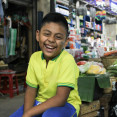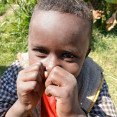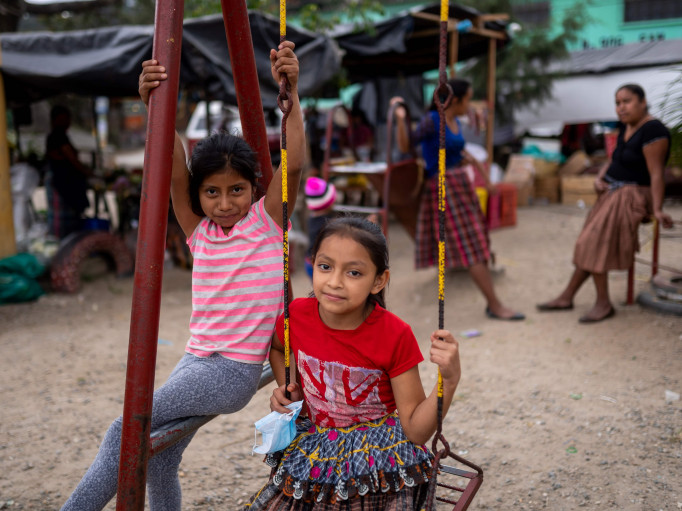
On 12th April, we recognise International Day for Street Children; a special day acknowledging the strength and resilience of millions of street children around the world. In collaboration with the Consortium for Street Children, this year the theme of this important day focuses on what makes street children feel safe or unsafe, and what governments and communities can do to ensure that street children are protected from harm.
Naomi Hall Opiyo, Toybox’s Director of Impact and Programmes, shares a reflection on Toybox’s work with street children and young people and how, alongside our local partners, we are working to protect their rights and their dignity.
What are some of the dangers that children and young people in street situations face?
So many! If you were to close your eyes and think of some of the most unsafe areas of a city you know – especially at night - and then picture your children, grandchildren, nieces, or nephews in that situation - without a trusted adult - how do you feel? What dangers are you thinking of - or don’t even want to imagine? You likely thought of a city in the UK where, although not perfect, likely has street lighting, police available to respond to a 999 call within minutes, and safe spaces for children and young people if for some reason they have felt forced to flee violence or a negative home environment, as well as free healthcare and education.
In the countries and cities where Toybox works, children and young people in street situations face harassment by police and are scapegoated for crimes. They are also at risk of violence from family members, gangs, peers and even the authorities. Girls in particular are at high risk of sexual abuse and exploitation. Children and young people in some of the countries we work in face the additional danger of gang violence and recruitment, where they may be forced to conduct activities such as selling drugs or criminal activities for gangs and live in fear of retaliation by rival gangs. Lack of shelter meaning exposure to the cold, wind, rain and heat and lack of safe space for their belongings or to rest, play or do schoolwork is also a huge challenge. For children who are not registered, if something happens to one of them, they may not have an adult or family member who realises or follows up. This puts them at risk of trafficking and exploitation.
How are Toybox and our partners working to protect children and young people?
A major focus of our partners’ work is helping children in street situations to understand and realise their rights, which are upheld in international and national law, but often not in practice. For example, the right to an identity, to education, and to health and alternative care. They should also not be discriminated against due to being connected to the street.
Some of the ways this work is delivered in the short term is through street outreach both during the day and at night. This may involve checking where they are sleeping, if they need any first aid, or any support with any personal challenges (for example with family, accessing education, health care or their birth certificate). It also involves training of local leaders, teachers, and authorities to break down stigma and discrimination and positive parenting training with parents and caregivers to enable a safer environment at home. With children and young people, workshops on a variety of topics including life skills, leadership and self-defence take place, as well as support to help them stay in school to reduce the amount of time they spend on the streets.
Some of the areas of long-term work that our partners’ deliver to help keep children safe includes reintegrating children and young people with families and communities, where it is possible and appropriate to do so. When this isn’t the best or safest option for children, young people are supported to develop the skills and means for independent living, away from the streets.
Toybox also supports our partners to advocate for policy changes which will help to reduce the push and pull to the streets (for example child protection systems, birth registration, economic empowerment, access to education, protection from violence, abuse and exploitation). We also advocate for children in street situations to be able to access the services they need to enable them to get out of the vicious cycle of poverty which keeps them on the streets - including poor health (including mental health), access to education, and credit and skills to start businesses or access employment.
Many of our partners advocate for the rights of children in street situations as part of national networks or consortia and also reach out to the general public and those in decision-making to challenge negative perceptions of street chilren. This may be directly or through radio and television and children themselves raise their voices through direct involvement in the content and recording of these.
How does birth registration help to keep children safe?
Birth registration is a critical foundation to ensuring children’s safety on so many levels. When children officially exist they can receive protection from the State and access basic services including healthcare and education. An identity document such as a birth certificate or passport also helps protect them from trafficking, exploitation, and detention. In some countries, birth certificates also give children rights to land, inheritance or property which gives them a more secure future.
Toybox partners around the world will be marking International Day for Street Children in a variety of different ways – from creative sessions with children on the streets to awareness campaigns in communities and discussions with local governments. Do keep an eye on Toybox’s social media @ToyboxCharity for further news and updates.

Naomi Hall Opiyo, Toybox's Director of Impact and Programmes
